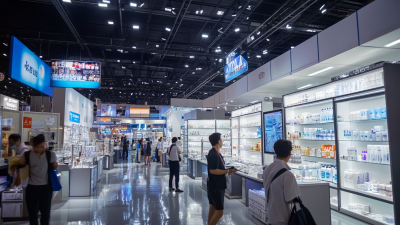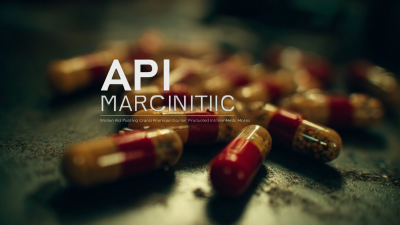In the ever-evolving landscape of the pharmaceutical industry, sourcing high-quality Active Pharmaceutical Ingredients (APIs) is a critical component for any successful operation. The global market offers a myriad of options, making it essential to navigate through this complexity to find the best API pharma products. Understanding the benefits of various sourcing strategies can empower businesses to enhance their supply chains, reduce costs, and maintain compliance with regulatory standards. In this blog, we will uncover five key secrets to effectively sourcing the best API pharma products from around the world. By leveraging these insights, pharmaceutical companies can not only optimize their operations but also ensure they are delivering safe and effective medications to patients. Join us as we explore the optimal pathways to secure top-quality ingredients that meet the demands of today's competitive market.

When sourcing API pharma products globally, identifying reliable suppliers is crucial for ensuring product quality and compliance. One of the key features to look for in a supplier is their adherence to regulatory standards. A reputable supplier should have certifications such as GMP (Good Manufacturing Practices) and ISO certifications, which demonstrate their commitment to maintaining high-quality production processes. Moreover, transparency in their operations allows for thorough audits, giving you confidence in their ability to meet your needs.
Another critical aspect is the supplier’s track record and experience in the industry. Suppliers with a proven history of successful partnerships and a stable market presence are often more dependable. It’s also beneficial to seek suppliers who have established relationships with regulatory bodies and can provide robust documentation and support during inspections. Additionally, evaluating their supply chain management practices can shed light on their reliability, as suppliers who maintain strong relationships with raw material providers are better equipped to deliver consistent and high-quality products to their clients.

In the increasingly complex global marketplace, understanding sourcing opportunities across regions is crucial for procuring the best API pharma products. Geographic dynamics are shifting due to emerging trends, which can provide significant advantages for savvy businesses. For instance, Southeast Asia is positioning itself as a key manufacturing hub. This region is witnessing a diversification of supply chains, making it an essential focal point for sourcing strategies. Companies that tap into this burgeoning market may not only enhance their procurement efficiency but also capitalize on more competitive pricing structures.
Moreover, geopolitical changes are reshaping the procurement landscape, compelling organizations to adopt robust sourcing strategies that offer maximum value. As companies navigate these complexities, focusing on emerging markets can result in innovative procurement solutions. Factors such as limited power availability in certain areas highlight the need for businesses to explore alternative sourcing options that can sustain their operations in a volatile environment. By remaining adaptable and informed about regional opportunities, businesses can better position themselves in the global arena, ultimately leading to smarter and more effective sourcing of API pharma products.
| Region | Top Sourcing Opportunities | Common Challenges | Market Trends | Growth Potential (%) |
|---|---|---|---|---|
| North America | Biologics, Generics | Regulatory Compliance | Increasing R&D Investment | 5% |
| Europe | New Drug Formulations | Market Saturation | Focus on Sustainability | 4% |
| Asia-Pacific | APIs for Generics | Quality Control | Growing Aging Population | 7% |
| Latin America | Biopharmaceuticals | Political Instability | Rising Healthcare Expenditure | 6% |
| Middle East & Africa | Traditional Medicines | Infrastructure Challenges | Expansion of Health Services | 3% |
Assessing the quality of pharmaceutical active pharmaceutical ingredients (APIs) is critical for ensuring safety and efficacy in healthcare. Various industry standards guide this assessment, including Good Manufacturing Practices (GMP) and International Conference on Harmonisation (ICH) guidelines. According to a report by the FDA, nearly 70% of drug recalls in recent years can be traced back to quality issues related to APIs. This highlights the severe impact that subpar ingredients can have on public health and underscores the importance of stringent quality assessments.

In addition to compliance with regulatory standards, sourcing the best APIs requires a thorough analysis of supplier credentials and product specifications. A study by MarketsandMarkets estimated that the global API market will reach $232.8 billion by 2024, indicating a competitive environment where quality differentiation is key. Companies are encouraged to leverage advanced analytics and supplier audits to ensure transparency and reliability. Emphasizing robust quality standards not only mitigates risk but also fosters trust with consumers and partners, ensuring a sustainable product lifecycle in a market that increasingly values safety and efficacy.
When sourcing Active Pharmaceutical Ingredients (APIs) globally, balancing cost with quality is paramount. According to a report by IMS Health, around 60% of pharmaceutical companies cite cost as a primary factor influencing their sourcing decisions. However, the temptation to cut costs can lead to sourcing from suppliers who may not maintain the highest quality standards, potentially risking product efficacy and safety.
A comparison between various sourcing regions reveals significant cost disparities along with varying quality metrics. For example, while India offers competitive pricing with an average of 20-30% lower API costs compared to Western markets, the quality assurance processes can be inconsistent. Conversely, European manufacturers, although 15-25% more expensive, often adhere to stringent regulations that can enhance reliability. Ultimately, a thorough evaluation of supplier certifications, production capabilities, and historical compliance data is essential for achieving a sustainable balance between budget constraints and the need for quality in API sourcing.
When sourcing API pharma products globally, understanding the compliance requirements in various markets is crucial. Different countries have distinct regulatory frameworks, which can significantly impact the process and success of your sourcing strategy. For instance, while the FDA in the U.S. has stringent approval procedures, the EMA in Europe has its own standards that must be adhered to. Ensuring you are well-versed in these regulations will help you avoid costly delays and compliance issues.
Tip: Invest time in research to familiarize yourself with the regulatory landscape of the markets you are targeting. This could involve consulting with local experts or accessing regulatory documentation specific to pharmaceutical sourcing.
Additionally, maintaining strong relationships with suppliers can facilitate smoother navigation through regulatory hurdles. Suppliers who are knowledgeable about their local compliance requirements can provide invaluable insights, ensuring that your sourcing process remains efficient and effective.
Tip: Establish clear communication channels with your suppliers and prioritize collaboration. This approach not only enhances compliance understanding but also helps in anticipating potential challenges before they arise.





